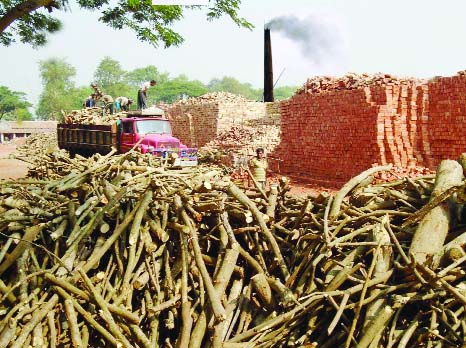
A Correspondent, Khulna :
Five brick kilns of Khornia in Dumuria of Khulna district are burning trees violating environmental law.
Local people said, the five brick kilns are operating due to negligence of Forest Department, Environment Department, District Administration and law enforcers.
On a recent spot visit, this correspondent found that some five brick kilns of Khornia area in Dumuria upazila of Khulna district, are burning woods at random.
Sources said, around 4 lakh tones of trees are being burnt in the brick kilns. In the last six months a total of 15 metric tones of woods were burnt and as a result the forest is being deforested in this way. At present at least 2000 maunds to 10,000 maunds logs are piled in front of each brick kilns.
It is alleged that the brick kiln owners are burning trees after managing the concerned authorities and influential political leaders since long.
Every year in winter, the illegal kilns begin to operate, local alleged.
Toxic emission from the kilns is posing a great threat to the environment and its inhabitants, said an environmentalist.
This correspondent saw piles of logs at the kilns except ‘Hawa Bhata’.
Locals alleged that the brick kiln owners are burning trees at random as the law enforcers are playing roles of silent spectators due to mysterious reason.
Owners of brickfields said, due to lack of collecting coal, they are being compelled to use trees in brick kilns.
Mollick Anwar Hossain, Director of Khulna Environment Directorate said, steps would be taken within short time against the brick kilns owners who are burning trees in the brick fields.
He also mentioned that different types of tasty foods like halua, payesh, bread, pauruti, biscuit, pastry and cake could be made through processing the indigenous potato.
“If we can make the people habituated to sweet potato consumption the nation can reduce its dependence on rice to a greater extent,” he said adding that steps should be taken to make the people in general aware in this regard.
In this context, he also said importance should be given to providing adequate training and agri-loans among the farmers.
ATM Rafiqul Islam, Deputy Manager of Barind Multipurpose Development Authority, said there is an enormous scope of boosting both acreage and yield of the indigenous crop through the best uses of the existing natural resources.
He said need-based steps should be taken for proper utlilization of its potentialities.
Five brick kilns of Khornia in Dumuria of Khulna district are burning trees violating environmental law.
Local people said, the five brick kilns are operating due to negligence of Forest Department, Environment Department, District Administration and law enforcers.
On a recent spot visit, this correspondent found that some five brick kilns of Khornia area in Dumuria upazila of Khulna district, are burning woods at random.
Sources said, around 4 lakh tones of trees are being burnt in the brick kilns. In the last six months a total of 15 metric tones of woods were burnt and as a result the forest is being deforested in this way. At present at least 2000 maunds to 10,000 maunds logs are piled in front of each brick kilns.
It is alleged that the brick kiln owners are burning trees after managing the concerned authorities and influential political leaders since long.
Every year in winter, the illegal kilns begin to operate, local alleged.
Toxic emission from the kilns is posing a great threat to the environment and its inhabitants, said an environmentalist.
This correspondent saw piles of logs at the kilns except ‘Hawa Bhata’.
Locals alleged that the brick kiln owners are burning trees at random as the law enforcers are playing roles of silent spectators due to mysterious reason.
Owners of brickfields said, due to lack of collecting coal, they are being compelled to use trees in brick kilns.
Mollick Anwar Hossain, Director of Khulna Environment Directorate said, steps would be taken within short time against the brick kilns owners who are burning trees in the brick fields.
He also mentioned that different types of tasty foods like halua, payesh, bread, pauruti, biscuit, pastry and cake could be made through processing the indigenous potato.
“If we can make the people habituated to sweet potato consumption the nation can reduce its dependence on rice to a greater extent,” he said adding that steps should be taken to make the people in general aware in this regard.
In this context, he also said importance should be given to providing adequate training and agri-loans among the farmers.
ATM Rafiqul Islam, Deputy Manager of Barind Multipurpose Development Authority, said there is an enormous scope of boosting both acreage and yield of the indigenous crop through the best uses of the existing natural resources.
He said need-based steps should be taken for proper utlilization of its potentialities.

